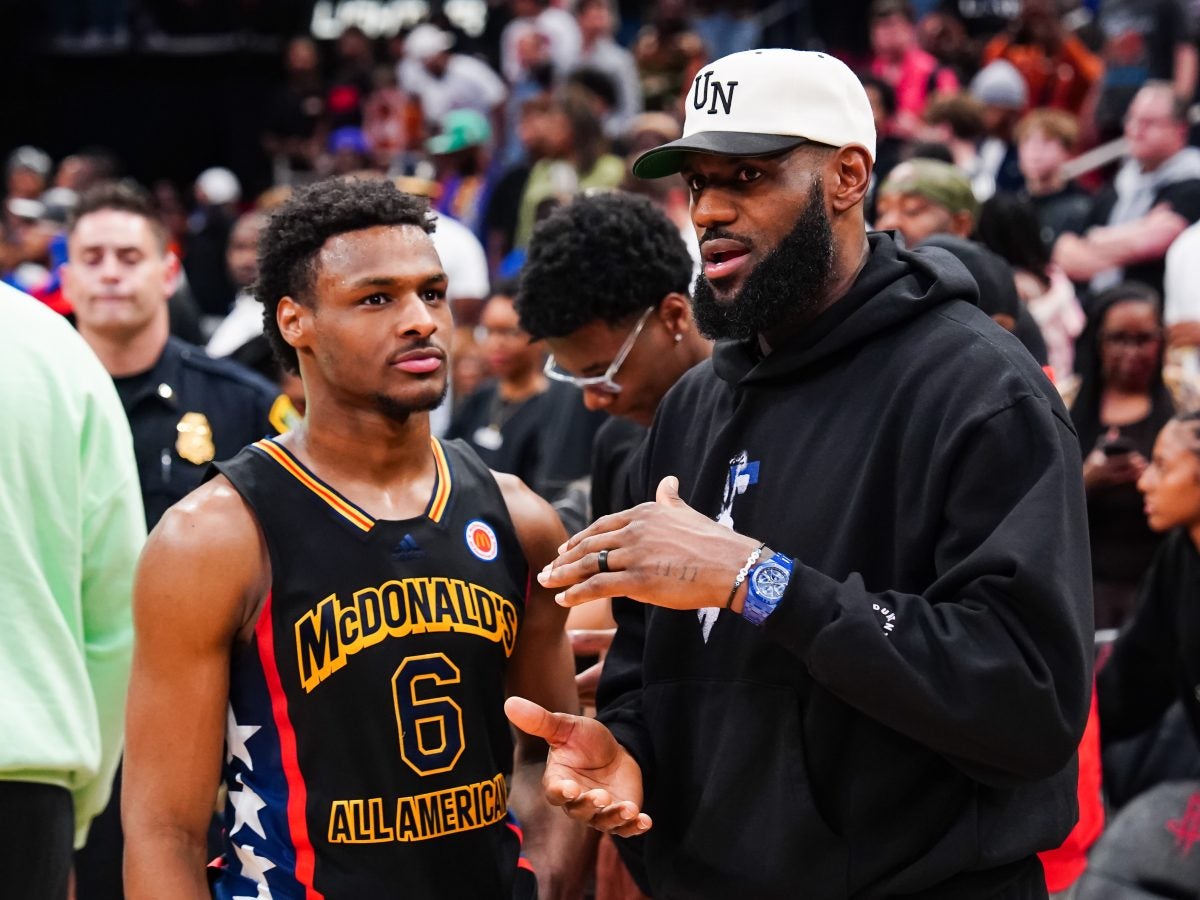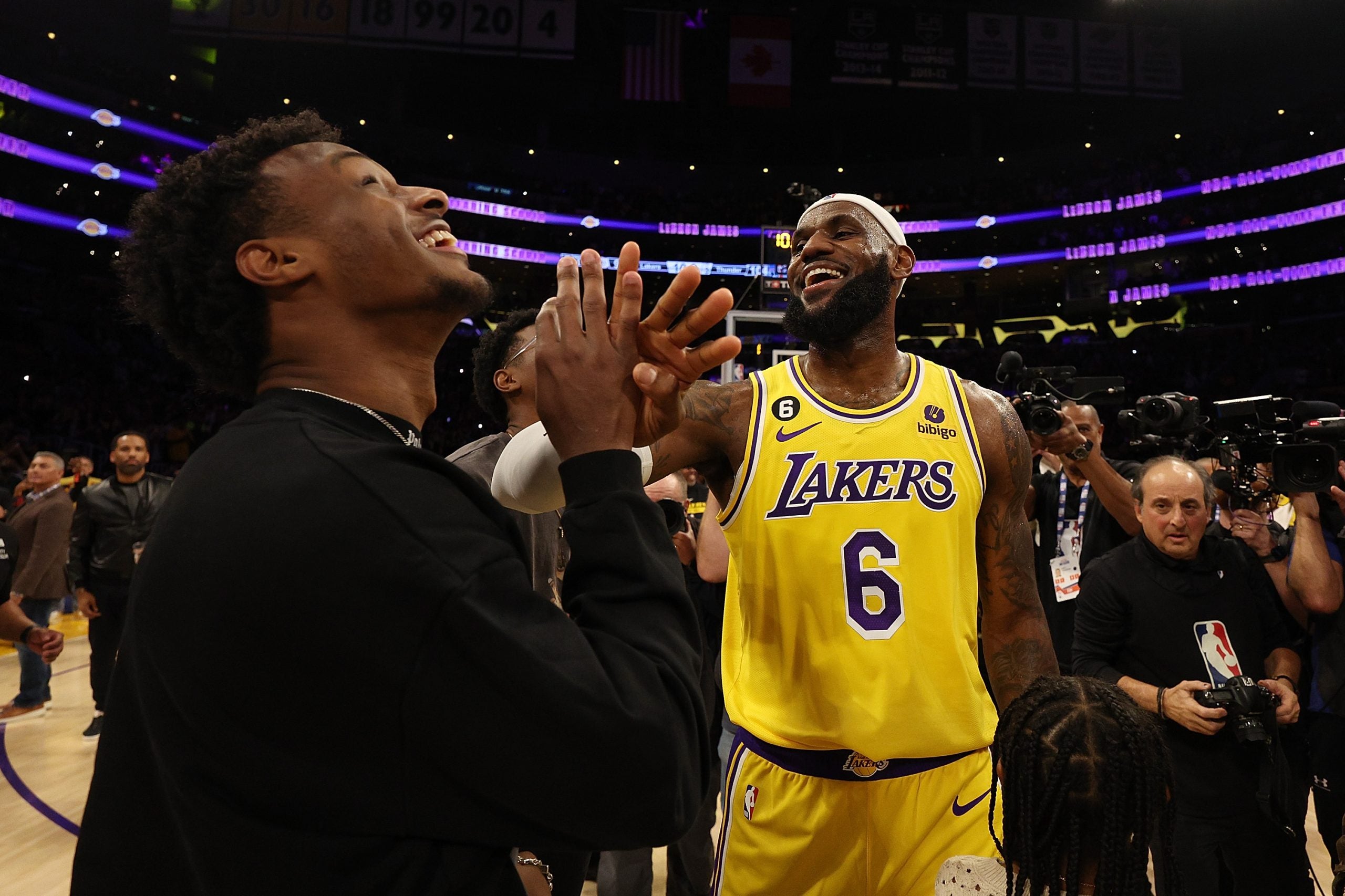
I hate the idea that Black folks should behave unethically simply because white people do so without reprimand or retribution. When you take the global history of white people into account, it’s clear they are not the moral standard. And our human decency should go beyond what we can get away with doing.
But when I saw people suggesting that LeBron James and his son LeBron (Bronny) James Jr. are practicing nepotism just like white folks, it didn’t make me bristle as it usually does.
Nepotism, the bequeathing of assets and opportunities to family and friends, often without merit, is indeed standard practice in the mainstream. We see it in legacy admissions to elite universities. It’s in the businesses passed down for generations, in unwarranted promotions handed out. Rumor has it that nepotism has run rampant in the NBA at the ownership/front office level.
There’s no question that Bronny being drafted by the Lakers is an example of such a practice. With an average of 4.8 points, 2.8 rebounds, and 2.1 assists during his time at USC, the younger James has yet to prove that he is ready for the league.
I realized Bronny being a part of the first father-and-son pair to play in the NBA at the same time doesn’t bother me because nepotism itself is not inherently immoral. Depending on how it’s practiced, it can be problematic, unfair, and disenfranchising. Historically, it has even been racist. But the idea of a Black father paving a path for his Black son strikes me as more natural than nepotistic.
It reminds me of a concept I came across in college that I’ve never forgotten. I was writing a paper for my beloved Black Mythic Fiction class when I found a story about an anthropologist who was studying the concept of work in southwest Ghana. One day, the anthropologist asked a local man if he owned the coconut plantations. He told her he did. Then she asked him how he classified the money he earned from the plantations. He used the word “nvasoe,” which means profit. The anthropologist challenged him a bit, saying that the word “nvasoe” speaks to money that a man has earned from his own work. But the man didn’t plant the coconut palms that made him money. The man told the anthropologist that his ancestors planted the palms and passed them down to him. She pushed back again, saying that “nvasoe” requires “gyima” work—which he had not done. The man looked at her and said, “My ancestors have worked.”
If we were in church, this is where the shout would come.

These days, you’ll often hear phrases like “generational trauma” or “generational curses.” But rarely do we talk about generational blessings, generational gifts, the good things our elders and ancestors have left for us to enjoy. It should be every parent’s prayer that the work they do benefits their children in some way. LeBron has worked diligently. And one of the fruits of his labor is a spot on the Lakers’ roster for his son.







But this is not the only fruit his work has produced. LeBron’s efforts have brought immeasurable value to the NBA. He’s scored the most points in NBA history. He’s carried three different teams to four NBA championships. At 39 years old, he’s still a formidable player and a global superstar. Even when he pissed fans off, announcing that he was taking his talents from Cleveland to South Beach (and vice versa), we had to watch. He is the league’s brightest star, the King.
One could ask what does the NBA owe LeBron? The answer is a lot. Likely more than they’d ever willingly pay. From a business perspective, the opportunity for his son to play, along with the paycheck he’ll collect, is a drop in the bucket of all that the future NBA Hall of Famer has given. All of this conversation works in the league’s favor as well. After all, many of us have never seen Bronny play a full basketball game, yet he’s already the talk of the town. People will be tuned in just to see if he’ll rise or fall. The NBA wins. Fans win. LeBron wins. If anything, this arrangement puts quite a bit of pressure on Bronny to show and prove while simultaneously tuning out the naysayers.
Hopefully, in his 19 years of life, Bronny has learned a thing or two about ignoring the racist-leaning critics from his new teammate. This is not the first time LeBron has been at odds with whiteness in his 21-year career. There was the backlash for his move to Miami, including that scathing letter from Cleveland Cavaliers owner Dan Gilbert. There were the “shut up and dribble” comments from journalist Laura Ingraham. He was criticized for celebrating Black women. Now, people are mad because he made a way for his son. This is the type of hypervigilance and hypocrisy that comes with being Black in this country, whether you have the platform and privilege of LeBron James or not. If we’re going to critique the concept of nepotism in this country, there are other, whiter places to begin. No need to start with the Black man who got his son in the door after twenty-plus years on the job.






